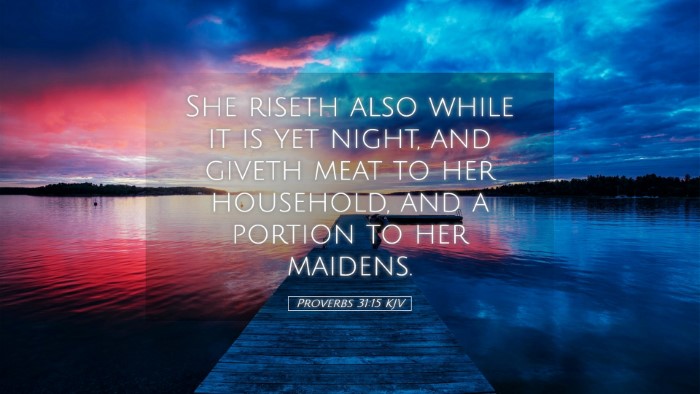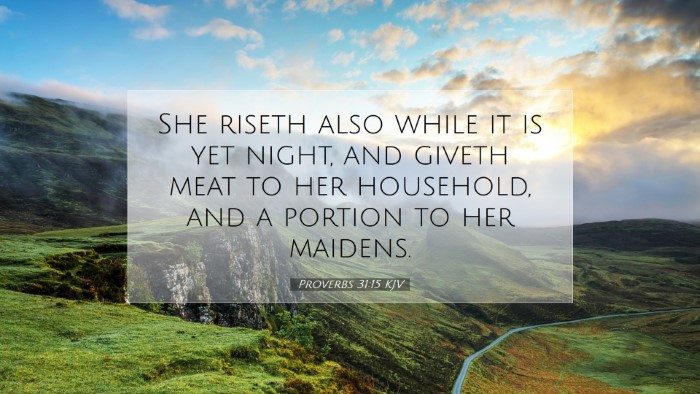Commentary on Proverbs 31:15
Proverbs 31:15 states: “She rises also while it is yet night, and giveth meat to her household, and a portion to her maidens.” This verse is part of the acrostic poem that describes the virtuous woman, and it provides profound insights into her character and responsibilities. Through combining commentary from various respected public domain sources, we’ll explore the depth of this verse to illuminate its meaning for pastors, students, theologians, and Bible scholars.
1. Contextual Analysis
The Book of Proverbs is primarily a compilation of wisdom literature, emphasizing moral instruction and ethical living. Proverbs 31 specifically highlights the attributes of a capable wife, often referred to as the 'virtuous woman.' This section serves as an exemplar of godly womanhood, showcasing her industriousness, piety, and care for her household.
2. The Significance of Rising Early
“She rises also while it is yet night”: The early rising of the virtuous woman reveals her diligence and commitment to her family's well-being. Matthew Henry writes that this detail indicates a strong work ethic and a readiness for the duties that lie ahead each day. Early morning represents a time of peace, when the world is still, and provides an opportunity for quiet reflection and planning.
Albert Barnes highlights that rising at night could imply the woman’s vigilance and her awareness of the needs of her family. It reflects a proactive approach, ensuring that her family is well-cared for before the day begins, illustrating her foresight and leadership within the home.
3. Provision and Care
“And giveth meat to her household”: This phrase portrays the nurturing aspect of the virtuous woman. Adam Clarke notes that her role includes providing sustenance, and this verse underscores her responsibility not just to feed but to nourish her family spiritually and emotionally as well. The term 'meat' can also denote the broader context of providing all essential needs.
This responsibility is regarded with great respect, as serving the needs of one's household signifies an innate understanding of God's design for family dynamics. The virtuous woman assumes a role of selflessness, prioritizing her family over her own needs, displaying Christ-like love and servitude.
4. Generosity Towards Servants
“And a portion to her maidens”: The mention of her maids indicates that her influence extends beyond her immediate family to those who serve her. Barnes observes that this demonstrates the virtuous woman’s kindness and equity. She does not overlook those who help her; instead, she ensures they are also provided for, reflecting an attitude of gratitude and generosity.
This aspect of her character enriches the community around her, demonstrating that a true leader considers the welfare of everyone connected to her life. Matthew Henry emphasizes that she commands respect from those under her care and provides for them generously, illustrating the principle that leadership is about service.
5. Practical Implications for Today
The characteristics outlined in Proverbs 31:15 can provide valuable insights for modern leaders, particularly in family and church settings. The priority of rising early can serve as a reminder to seek God and prepare for the day ahead, reflecting the wisdom found in Matthew 6:33, which calls believers to seek first the kingdom of God.
The act of providing for a household reflects more than just physical needs; it invites spiritual mentoring and emotional support. Pastors and leaders are encouraged to emulate this provision in both familial and congregational contexts, nurturing their flocks as the virtuous woman nurtures her household.
6. Conclusion
Proverbs 31:15 encapsulates an essential depiction of the virtuous woman, showcasing her industriousness, care, and generosity. The insights from Matthew Henry, Albert Barnes, and Adam Clarke aggrandize the notion that character and integrity within the home have far-reaching consequences. In light of this, may all who seek to live out these principles contribute positively to their families' and communities’ well-being and demonstrate a godly example for others to follow.


